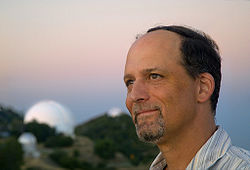Geoffrey Marcy | |
|---|---|
 Marcy in 2007 | |
| Born | Geoffrey William Marcy September 29, 1954 |
| Alma mater | University of California, Los Angeles (B.A.) University of California, Santa Cruz (Ph.D.) |
| Known for | Exoplanet discoveries |
| Awards | Henry Draper Medal (2001) Beatrice M. Tinsley Prize (2002) Shaw Prize (2005) |
| Scientific career | |
| Fields | Astronomy, astrophysics |
| Institutions | Carnegie Institution for Science San Francisco State University University of California, Berkeley |
| Doctoral advisors | George H. Herbig[1] and Steven S. Vogt[2] |
Geoffrey William Marcy (born September 29, 1954) is an American astronomer. He was an early influence in the field of exoplanet detection, discovery, and characterization. Marcy was a professor of astronomy at the University of California, Berkeley, and an adjunct professor of physics and astronomy at San Francisco State University. Marcy and his research teams discovered many extrasolar planets, including 70 out of the first 100 known exoplanets[4] and also the first planetary system around a Sun-like star, Upsilon Andromedae.[5][6] Marcy was a co-investigator on the NASA Kepler space telescope mission.[7] His collaborators have included R. Paul Butler, Debra Fischer and Steven S. Vogt, Jason Wright, Andrew Howard, Katie Peek, John Johnson, Erik Petigura, Lauren Weiss, Lea Hirsch and the Kepler Science Team.[3][8][7] Following an investigation for sexual harassment in 2015, Marcy resigned his position at the University of California, Berkeley.[9][10]
- ^ Cite error: The named reference
Autobiography of Geoffrey Marcywas invoked but never defined (see the help page). - ^ Tim Stephens (September 4, 2007). "Major gift supports crucial piece of Automated Planet Finder". University of California, Santa Cruz. Retrieved October 6, 2010.
- ^ a b Overbye, Dennis (May 12, 2013). "Finder of New Worlds". The New York Times. Retrieved May 13, 2014.
- ^ Marcy, G.W. (2014). "Technology Enabling the First 100 Exoplanets". AAS Meeting Abstracts. 223: 91.03. Bibcode:2014AAS...223.9103M.
- ^ "A Family of Giants: First System of Multiple Planets Found around a Sun-like Star". NASA Science News. NASA. Archived from the original on August 21, 2010. Retrieved August 16, 2015.
- ^ "SFSU Public Affairs Press Release: First system of multiple planets found around a Sun-like star". San Francisco State University. Public Affairs Office at San Francisco State University. Retrieved August 16, 2015.
- ^ a b "Kepler Team". Kepler: A Search For Habitable Planets. Ames Research Center. April 10, 2015. Archived from the original on May 28, 2010. Retrieved August 18, 2015.
- ^ Lemonick, Michael (December 16, 2009). "Super-Earth: Astronomers Find a Watery New Planet". Time. Archived from the original on December 18, 2009. Retrieved December 17, 2009.
- ^ Nanette Asimov (October 14, 2015). "Embattled astronomer resigns from UC Berkeley post amid sex harassment scandal". San Francisco Chronicle.
- ^ Overbye, Dennis (October 14, 2015). "Geoffrey Marcy to Resign From Berkeley Astronomy Department". The New York Times. Retrieved October 15, 2015.